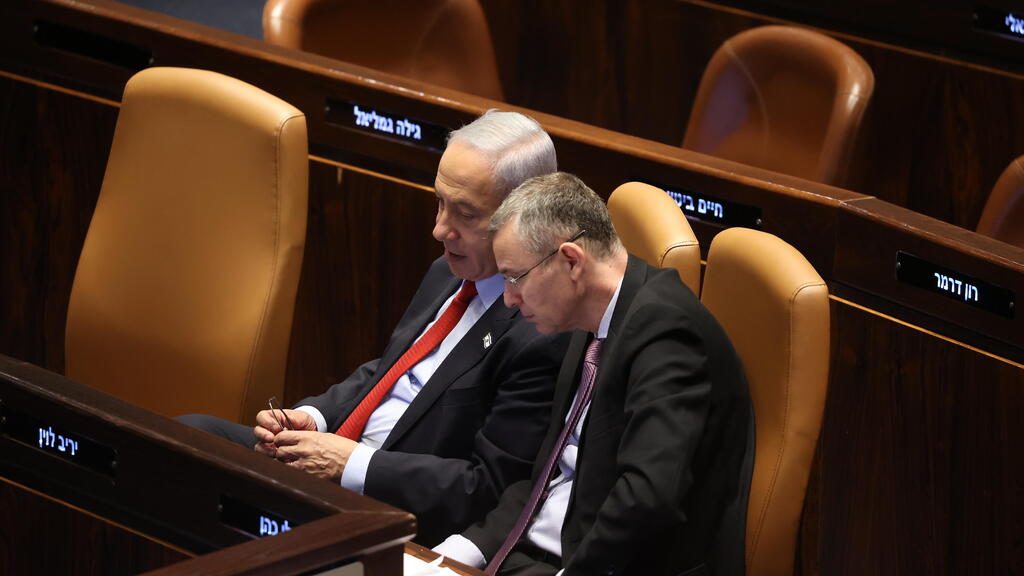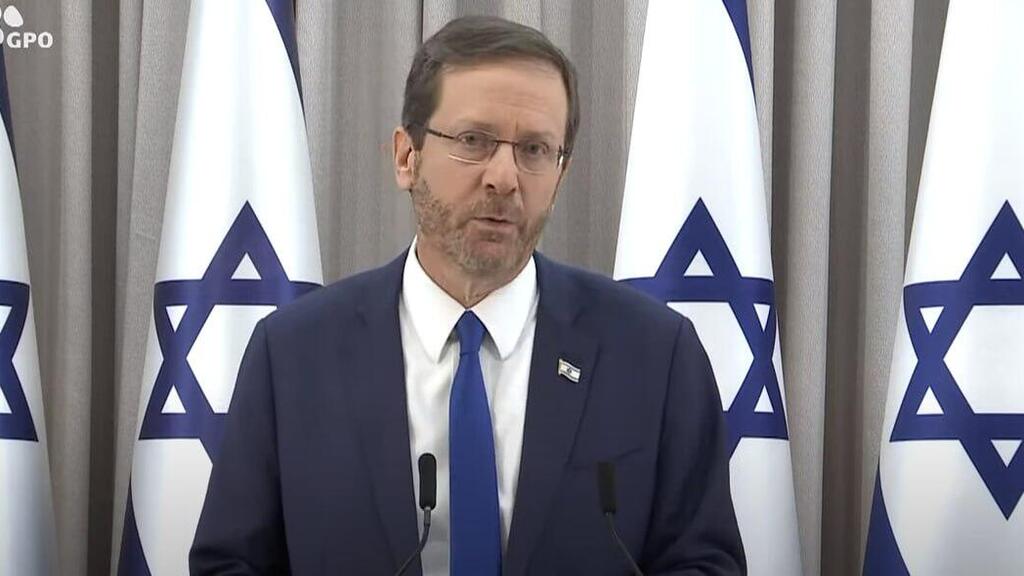President Issac Herzog on Wednesday presented his "people's compromise," to end the crisis over the government's overhaul of the judicial system.
The president's plan protects the independence of the judiciary, preserves the power of the attorney general and the legal advisors and calls for legislation of basic laws in the spirit of the Declaration of Independence.
In his speech, the president said the country was on the verge of civil war and at a critical juncture and his proposal is a compromise road that adequately addresses all concerns and perceptions.
"As I've said before - if only one side wins, nobody wins," he said. "This will strengthen the Knesset, the government and the judiciary and protect Israel as a Jewish and democratic state."
Prime Minister Benjamin Netanyahu rejected the compromise claiming in a statement that it did not provide the needed changes to the judicial system.
The making and amendment of Basic Laws (Basic Law: The Legislation)
1. Basic Laws are the foundation for the state constitution, established according to the
founding principles of the Declaration of Independence, while anchoring the values
of the State of Israel as a Jewish and democratic state.
2. Basic Laws establish and govern the basic structure of government,, state
institutions, the state's basic principles, and human rights.
3. A Basic Law shall state in its title that it is a Basic Law without setting a date of
enactment.
4. A Basic Law may not be repealed or changed except by a Basic Law.
5. A law will not derogate, repeal or change a Basic Law.
6. Emergency regulations do not have the power to derogate, repeal or change a Basic
Law.
7. A Basic Law will be enacted in four readings in the Knesset.
8. A Basic Law will be enacted or amended in the first, second, and third readings by a
majority of at least 61 members of the Knesset, followed by a fourth reading in the
plenary session of the Knesset in the form approved in the third reading, if one of
the following occurs:
- The fourth reading was accepted by a majority of 80 members of the
Knesset at the Knesset session intended for this matter, provided that it was
held at least three months after the third reading and that it was not held in
the first six months of the Knesset's tenure.
- The fourth reading was accepted by a majority of 70 members of the
Knesset at a session designed for this matter and held in the Knesset which
follows the one that voted on the law in the first three readings, provided
that at least three months have passed after the Knesset has convened.
9. There will be no votes on Basic Laws after a decision has been made to dissolve the
Knesset.
10. To amend provisions in the Basic Law: The Knesset, which guarantees fair and equal
elections: elections equality, the right to vote, the right to be elected, and the
prohibition of extending the Knesset's term of office, a majority of 80 MKs will be
required in all four readings.
11. A Basic Law that was in effect before the publication of this document will be
considered as accepted according to the Basic Law: The Legislation, and the
provisions of the Basic Law: The Legislation as stipulated in this document will apply
to it.
12. Basic Law: The legislation will also include provisions regarding the manner of
enacting primary legislation and secondary legislation.
Judicial review of legislation (Amendments to Basic Law: The Judiciary)
1. The Supreme Court, has exclusive jurisdiction to determine that a law is invalid due
to a contradiction with the provisions of a Basic Law.
2. No court has the authority to exercise judicial review of Basic Laws that have met all
the procedural conditions required for their enactment, in accordance with the
arrangement set forth in this document.
- An agreed outline for military service or civil-national service legislation shall
be set forth. The main points of the outline will be enacted as an
amendment to a basic law, and therefore will be immune to judicial review,
in accordance with the provisions of the arrangement in this document.
3. The Supreme Court may determine that a law is invalid, in an expanded panel of no
less than 11 judges, and by a majority of no less than two-thirds of the panel.
4. If a majority of the panel of judges but less than two-thirds rules that a law
contradicts the provisions of a Basic Law, the court may issue a declaration of
incompatibility.
A declaration of incompatibility shall not have the power to nullify the validity of a
statute. Following such declaration, The Knesset will discuss the law and examine
legislative amendments as necessary.
5. Provisions will be established for the transfer of the decision on the question of the
validity of a law due to a contradiction with a Basic Law from the other courts of
jurisdiction to the Supreme Court, according to the arrangement established in this
document.
6. Judicial review of legislation will continue to apply to the full extent of the rights
derived from the right to human dignity, including the right to equality, as
interpreted in the case law of the Supreme Court through to the enactment of the
arrangements set forth in this document.
Selection of judges (Amendments to the Basic Law: The Judiciary)
1. The judicial selection committee will include 11 members:
- The Minister of Justice, and two additional ministers to be chosen by the
government.
- The President of the Supreme Court, and two other associate judges of the
Supreme Court that are to be elected by its fellow judges, subject to the
provisions of appropriate representation as detailed below.
- Three members of the Knesset, among them one coalition member and two
members from different opposition parties. The coalition representative will be
elected by the coalition; the opposition representatives will be elected by the
opposition parties. If an opposition party joined the coalition or withdraw from
the coalition, new representatives will be elected accordingly.
- Two representatives of the public, jurists, who are qualified to serve as Supreme
Court judges, in accordance with the Courts Act and who have rich experience
in judging or practicing law or academia, appointed by the Minister of Justice
with the consent of the President of the Supreme Court. The representatives of
the public will be appointed for the term of office of only one Knesset without
eligibility for re-appointment.
2. Provisions will be established by law or regulations to ensure the independence of judgment of all committee members.
3. The committee will select judges to the Supreme Court by a majority of seven
committee members.
4. The committee must include in the selection process considerations such as: the
professional level of the candidates, a reflection of the diversity of groups in Israeli
society; the needs of the Supreme Court regarding the diversity of the areas of
expertise of its judges, and the diversity of the composition of the judges in relation
to their theological-judicial worldview.
5. At least one of the representatives of the Supreme Court judges on the committee,
at least one of the government representatives on the committee, at least one of
the Knesset representatives on the committee and at least one of the public
representatives on the committee will be women. At least one of the members of
the committee will be a representative of the Arab society.
6. The committee will elect the president and vice president of the court, in
accordance with the existing practice, according to the date of appointments of the
judges.
7. The number of judges in the Supreme Court will be based on current practice, and
the retirement date of the judges will be in accordance with the provisions
established by law today.
8. The committee will select judges for lower courts by a majority of seven committee
members, provided that one of them is a serving judge of the Supreme Court. Two
representatives of the Bar Association will participate as observers in these
committee meetings.
9. The committee will select a candidate to serve on lower courts only if the candidate
has successfully passed a preparation course for a judgeship; details regarding the
format of the course will be regulated by law; The committee will be entitled to
appoint to the position of judgeship a person who has not successfully passed the
course by unanimous decision of all committee members.
10. Impeachment of judges will be by a majority of nine out of eleven committee
members, including the President of the Supreme Court.
Establishing basic rights under law (Amendments to the Basic Law: Human Dignity and Liberty)
1. Basic Law: Human Dignity and Liberty shall formally codify the right to equality and the
prohibition of discrimination; the right to freedom of expression, opinion,
demonstration, and assembly.
2. At the same time, a constitutional process will be initiated with public participation at
the President's House where a discussion will be held on the core constitutional issues of
the State of Israel, taking into account the diverse nature of Israeli society and the
formulation and completion of a comprehensive Bill of Basic Rights, with broad
consensus, which will be anchored in a Basic Law.
Reasonableness (Amendments to the Government Act)
1. The decisions of the government in its plenary in matters of policy and
appointments of ministers will not be reviewed by a court under the reasonableness
standard alone.
2. Decisions of ministers in matters of policy shall not be overturned on the grounds of
unreasonableness alone unless they are arbitrary or capricious
3. Notwithstanding the above, the reasonableness standard will continue to apply,
insofar as it applies according to the ruling of the Supreme Court moving to the
enactment of the arrangements set forth in this document, as far as the rest of the
executive branch.
Legal advice to the government (Amendments to The Government Act)
1. The status of legal advisers to government ministries:
a. A legal adviser shall be appointed for a term of 6 years.
b. The appointment of the legal advisers will be conducted as a professional
search process in the civil service and the independence of the legal advisors
will be preserved. The procedure will be conducted by means of a tender as is
customary today.
c. Without deviating from the provisions of the law regarding the transfer of a
civil servant from his position, a minister may initiate the removal of a legal
advisor from office if there are substantial and ongoing disagreements
between them that prevent effective cooperation. This is subject to the
approval of a committee whose members will be the Attorney General, the
Civil Service Commissioner, a representative from the relevant ministry to be
appointed by the Director General, and a former Director General of a
government office to be appointed by the Civil Service Commissioner, with the
approval of the Attorney General. The committee's decisions will be made by
a majority of its members.
2. The opinion of the Attorney General and the legal advisers to the government
ministries regarding the law is binding for the offices, departments and agencies in
which they serve.
3. Despite the above, the opinion will not be binding with regard to the
constitutionality of the draft of bills that the government wishes to advance on the
Knesset.
4. A minister will be entitled to appeal before the Attorney General over the opinion of
the legal advisor of the office where the minister serves.
5. If a petition was filed against the government or its members, and the Attorney
General decides that he or she will not represent the position of the government or
its members before the courts, as the case may be, the government or its members
will be entitled to receive separate legal representation before the courts.
A multi-year plan to reduce the burden on the judicial system
1. The number of judges in Israel is significantly lower than the norm in the western
world, while the number of cases opened is particularly high compared to the
international average. In order to optimize the work of the court system, ease the
judicial burden and improve the service provided to the citizens, it is necessary to
add hundreds of judicial positions.
2. A multi-year plan will be adopted to reduce the burden on the judicial system. This is
subject to staff work to be conducted by the administration of the courts, to
improve the service provided to the citizen and to reduce the burden on the judicial
system, and appropriate regulations will be established for this purpose.
Transition and validity provisions (will be included in Basic Law: The Legislation)
1. No additional arrangements will be enacted during the period of the 25th Knesset
dealing with the relationship between the authorities or changing the status of the
judiciary or its rules of operation, the legal advice to the government and its
branches.
2. A mechanism will be established to examine the need to move specific
arrangements currently found in the provisions of the Basic Laws to regular
legislation or to repeal them. For a period of 8 years, the Knesset will be entitled to
repeal by a majority of its members a provision in the Basic Law that existed on the
eve of the new Basic Law: The Legislation, with the exception of the articles listed in
the Basic Law: Human Dignity and Liberty, Basic Law: Freedom of Occupation, Basic
Law: The Knesset; Basic Law: The Government, Basic Law: The Judiciary and Basic
Law: Israel, The Nation-State of the Jewish People.
Justice Minister Yariv Levin presented the coalition's plan which included ending the courts' ability to overrule laws, a majority to the ruling coalition in the selection of judges and Supreme Court justices, and laws that would give politicians power over legal advisors and opinions.
Israelis went to the street in mass demonstrations to protest what they called the destruction of Israeli democracy.
Herzog had been meeting with legal experts, captains of industry and other experts to formulate his compromise proposal. In a speech last week, he said the government's proposal was destructive and should be thrown out.
"Our democracy is a value, an independent judiciary, is a value, the rights of the minorities, gender equality, are our values, and yes more diversity in our courts is also a value," he said.
Netanyahu, who delayed his departure to Germany, scheduled for the afternoon to the late evening hours was in communication with the president and reportedly agreed to much of his proposed compromise.
Cabinet secretary Yossi Fox who has replaced Netanyahu in all matters pertaining to the legislation described the compromise as one-sided and had not been agreed to by any member of the coalition.
Netanyahu was barred by the attorney general, from involvement in the manner because of his ongoing criminal trial for bribery, fraud and breach of trust, out of concerns of a conflict of interests.
Levin however, refused changes to his program's selection of judges even after talking to Herzog. He is in mourning for his father who passed away earlier this week and spoke to Netanyahu and Herzog from his home.
3 View gallery


Prime Minister Benjamin Netanyahu and Justice Minister Yariv Levin at the Knesset
(Photo: Amit Shabi)
Herzog spoke to German President Frank-Walter Steinmeier on Tuesday and briefed him on the compromise proposal ahead of his meeting with Netanyahu on Thursday. Steinmeier had publicly expressed his concern over the government's legislative action.




